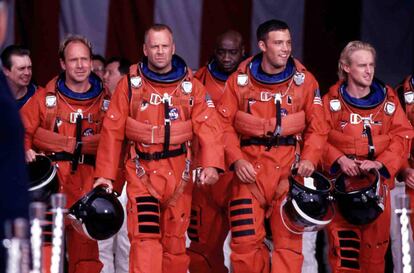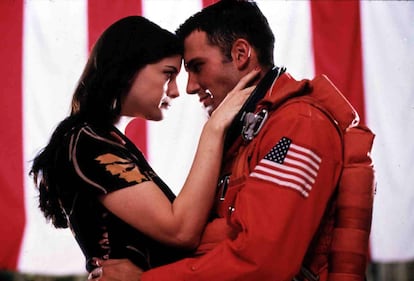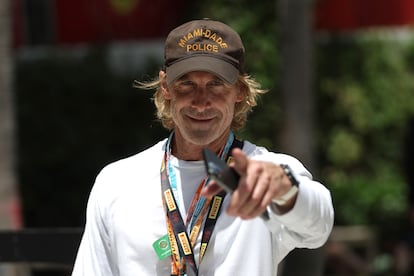A brainless American flick, turned into a work of art: 25 years after its release, ‘Armageddon’ still fascinates the public
Despite poor reviews at the time, Michael Bay’s film was the biggest hit of 1998, giving Bruce Willis his last major role as an action hero. Over time, it has been reappraised as a classic

The highest-grossing film of 1998 begins with a voiceover by Charlton Heston, who recalls the extinction of the dinosaurs and warns about the possibility of another lethal meteorite hitting Earth.
Armageddon exploded as it appeared on the screen, immediately giving way to the name of the headline star of the blockbuster: Bruce Willis. This month marks the 25th anniversary of the movie’s arrival to theaters, which marked a new milestone in the summer cinema of the 1990s, in which orgies of explosions, disasters, patriotism and impossible plot concepts dominated. Despite these kinds of productions so often being derogatorily categorized as “American,” director Michael Bay responds with his head held high, scattering his body of work with zillions of shots of flag-waving.
With its adrenaline-pumping cuts and hysterical pace, Armageddon is definitely a “dad movie.” Kevin Clark – a film critic for The Ringer – explains that “ordinary [older] men facing extraordinary situations” is the “soul” of Michael Bay’s genre. This is what Armageddon clearly offers: an enthusiastic exaltation of the eternal worker, who puts the head honcho from Washington and the smart-ass from NASA in their place. The heroes are off to “kick the asteroid in the ass” – the object that threatens to extinguish humanity.
The terrifying terms in which the plot unfolds are the following: a meteorite “the size of the state of Texas” is heading towards our planet… and the only way to stop it is to detonate a bomb inside it. To do this, NASA recruits the head of an oil company (Willis), who puts his workers at the service of the mission “on the condition of not paying more taxes.”
“I asked Michael Bay why it was easier to teach drillers to be astronauts than to teach astronauts to be drillers, and he told me to shut the fuck up,” recalled Ben Affleck – the other star of the film – in the bonus footage on the DVD. Affleck’s relationship with Liv Tyler – Willis’ fictional daughter – provides the romantic plot, added in by uncredited screenwriter Scott Rosenberg, in the wake of the success of Titanic (1997). Like Affleck, the bulk of the movie critics of the time banged their heads against a wall while trying to analyze the rationale of the screaming drillers fighting against a meteorite that has its own gravity. But for the director, obviously, the important thing was emotion and spectacle: “I know there can’t be fire in space, but it’s a movie,” Bay shrugged, in the extra content included in the US edition. Producer Jerry Bruckheimer highlighted – in a complimentary fashion – the filmmaker’s ability to “think like a 14-year-old boy.” Bruckheimer had been Bay’s mentor in his two previous films: Bad Boys (1995) and The Rock (1996).

The film – which cost $140 million to make – grossed more than $550 million worldwide, a figure that allowed it to easily surpass its direct competitor, Deep Impact (which was released in May of 1998 and is also about a threatening asteroid). That production – directed by Mimi Leder – was more highly-regarded by the scientific community. On the other hand, NASA collaborated on Armageddon, hoping that the film would be useful for attracting new recruits, in the same way that Top Gun (1986) was used by the Navy to generate interest. However, it’s worth noting that NASA included a message at the end of Bay’s film, clarifying that it didn’t endorse the content or the portrayal of its professionals.
Armageddon saw the last big action hero role for Bruce Willis, who got better press the following year for The Sixth Sense (1999). And, because of the film, the band Aerosmith managed – for the first and last time – to lead the Billboard singles chart, thanks to the ballad I don’t wanna miss a thing, which is omnipresent in the narrative. It all stays in the family: singer Steven Tyler – in case anyone was unaware – is the real father of Liv Tyler.
Author’s cinema
“It’s a fundamental film, along with Independence Day (released in 1996 by Bay’s great rival in the genre of catastrophes: Roland Emmerich), to understand the evolution of an adventure blockbuster towards a more hyper-spectacular type [of cinema], with chaos and special effects. [Armageddon] had a decisive influence on what we’re now immersed in. You can’t understand Marvel movies, for example, without the long sequences of destruction and action,” explains Yago Paris, a researcher in film studies who has written a thesis on Michael Bay’s work.
In the opinion of Paris, the director – whom he considers to be “a clear heir of Tony Scott” (the man who directed Top Gun) – hasn’t obtained the recognition he deserves. Bay is often reduced to clichés, with critics sneering at his penchant for “dedicating himself to destroying things,” or at the frenzy of his images, always accompanied by music and linked to a culture of attention deficit and overstimulation. “Armageddon is the first 150-minute-long trailer – an assault on the eyes, ears, brain and common sense,” declared Roger Ebert – the popular film journalist – when Armageddon was released.
“Even when he’s recognized as a creator, he’s recognized as a bad creator – he’s looked down on,” Paris laments. “Those who defend him do so from [a place of] cool cynicism; he’s not taken seriously. The lack of research on him seems flagrant to me.” One of the few tests sincerely dedicated to his body of work is Michael F***ing Bay: The Unheralded Genius in Michael Bay’s Films, self-published in 2014 by screenwriter Adam Mallinger (better known online as The Bitter Script Reader). He explains that he wrote it while giving Bay “the benefit of the doubt.”
“Professional critics have derided his video-clipping visual style – full of quick cuts, moving shots and horny women. But even though commercial success and meaningful art don’t have to go hand-in-hand, can a filmmaker truly hit the mark with the audience without doing something artistically right?” he asks in the book.

These students of film aren’t the only ones to depart from the traditional negative consensus against the director. The anti-Bay narrative has become somewhat outdated in recent years, as evidenced by the positive reception that some of his films have received, including Pain & Gain (2013) and 13 Hours: The Secret Soldiers of Benghazi (2016). The Criterion Collection – the prestigious label dedicated to distributing “important classic and contemporary films” – even included Armageddon in its selection. It now rubs shoulders with artistic European titles in the catalogue, such as The 400 Blows (1959) or Persona (1966).
“Armageddon is a work of art by an avant-garde artist, who is a master of movement, light, color and form, as well as chaos, dazzle and explosion,” says film historian Jeanine Basinger in an essay for Criterion. “It’s never confusing, it’s never boring, and it’s never less than a brilliant mixture of what movies are supposed to do: tell a good story, depict characters through active events, invoke an emotional response, and entertain simply and directly, without pretense.”
Written by J.J. Abrams – the co-creator of Lost (2004-2010) and the latest Star Wars trilogy – and a battalion of other writers, Armageddon also marked the careers of its dense cast. In addition to extending the legend of Bruce Willis – who is already retired, due to suffering from frontotemporal dementia – the film bolstered the commercial trajectory of young people such as Affleck, Tyler, Owen Wilson, Steve Buscemi, Billy Bob Thornton and Peter Stormare. Incidentally, writer Brandon Zachary described Stormare’s performance as being “the most cartoonish representation of a Russian since The Adventures of Rocky & Bullwinkle.” There were also numerous supporting roles, while new actors such as Michael Clarke Duncan got their big break on the set. He would go on to be nominated for an Oscar for The Green Mile (1999).
In 2013, a misunderstanding with a Miami Herald journalist led the newspaper to publish information in which a phrase was attributed to Michael Bay. In the comment that was printed, he apparently repented about having made Armageddon and attempted to justify its artistic results with the speed with which it was filmed (16 weeks). However, the satisfaction among his detractors was short-lived – as soon as the interview was published, Michael Bay took to his blog to explain that what he regretted was having so little time to perfect the editing, particularly his third act. Come on now – Bruce Willis didn’t save us all by drilling inside a meteorite for the director to simply bow his head in shame.
“It’s one of the most-shown movies on cable TV,” Bay reminded his critics. “And yes, I’m proud of the movie. Enough said. I will never apologize in the slightest for Armageddon.”
Sign up for our weekly newsletter to get more English-language news coverage from EL PAÍS USA Edition
Tu suscripción se está usando en otro dispositivo
¿Quieres añadir otro usuario a tu suscripción?
Si continúas leyendo en este dispositivo, no se podrá leer en el otro.
FlechaTu suscripción se está usando en otro dispositivo y solo puedes acceder a EL PAÍS desde un dispositivo a la vez.
Si quieres compartir tu cuenta, cambia tu suscripción a la modalidad Premium, así podrás añadir otro usuario. Cada uno accederá con su propia cuenta de email, lo que os permitirá personalizar vuestra experiencia en EL PAÍS.
¿Tienes una suscripción de empresa? Accede aquí para contratar más cuentas.
En el caso de no saber quién está usando tu cuenta, te recomendamos cambiar tu contraseña aquí.
Si decides continuar compartiendo tu cuenta, este mensaje se mostrará en tu dispositivo y en el de la otra persona que está usando tu cuenta de forma indefinida, afectando a tu experiencia de lectura. Puedes consultar aquí los términos y condiciones de la suscripción digital.









































